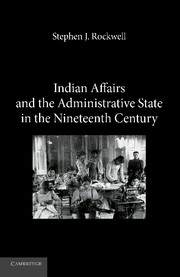Book contents
- Frontmatter
- Contents
- Acknowledgments
- Introduction
- 1 The Myth of Open Wilderness and the Outlines of Big Government
- 2 Managed Expansion in the Early Republic
- 3 Tippecanoe and Treaties, Too: Executive Leadership, Organization, and Effectiveness in the Years of the Factory System
- 4 The Key to Success and the Illusion of Failure
- 5 Big Government Jacksonians
- 6 Tragically Effective: The Administration of Indian Removal
- 7 Public Administration, Politics, and Indian Removal: Perpetuating the Illusion of Failure
- 8 Clearing the Indian Barrier: Indian Affairs at the Center of National Expansion
- 9 Containment and the Weakening of Indian Resistance: The Effectiveness of Reservation Administration
- 10 What's an Administrator To Do? Reservations and Politics
- Conclusion: The Myth of Limited Government
- References
- Index
2 - Managed Expansion in the Early Republic
Published online by Cambridge University Press: 06 July 2010
- Frontmatter
- Contents
- Acknowledgments
- Introduction
- 1 The Myth of Open Wilderness and the Outlines of Big Government
- 2 Managed Expansion in the Early Republic
- 3 Tippecanoe and Treaties, Too: Executive Leadership, Organization, and Effectiveness in the Years of the Factory System
- 4 The Key to Success and the Illusion of Failure
- 5 Big Government Jacksonians
- 6 Tragically Effective: The Administration of Indian Removal
- 7 Public Administration, Politics, and Indian Removal: Perpetuating the Illusion of Failure
- 8 Clearing the Indian Barrier: Indian Affairs at the Center of National Expansion
- 9 Containment and the Weakening of Indian Resistance: The Effectiveness of Reservation Administration
- 10 What's an Administrator To Do? Reservations and Politics
- Conclusion: The Myth of Limited Government
- References
- Index
Summary
Thomas Jefferson, the patron saint of limited government, established a land office before the Revolution to sort through and organize the complicated claims and legal implications of speculation in the western portions of Virginia. Jefferson championed royal and colonial government channels as the appropriate paths for managing land speculation, stabilizing cessions from Indians, and establishing title to Western lands – often in opposition to the crafty and creative efforts of pioneering individuals. It is President Jefferson who maintained and expanded the Washington administration's efforts to regulate the fur trade in the early republic, and it is Jefferson who convinced Congress to give the president authority over other areas of the western economy, such as the alcohol trade. It is Jefferson, of course, who sparked the nation's most famous federal enterprise in scientific and military exploration, the Lewis and Clark expedition, in support of a vast extension of U.S. authority across North America; Jefferson made parallel efforts in the Southwest and drove an aggressive land acquisition policy over and above the prominent example of the Louisiana Purchase. And it is Jefferson who is credited with the first serious proposals for Indian removal, a giant public policy effort to relocate hundreds of thousands of American Indians from their homes east of the Mississippi. It is also Jefferson who promoted the use of federal mechanisms to educate a national populace, and to remove whites who had settled west of the Mississippi, and to remove blacks out of the United States.
- Type
- Chapter
- Information
- Publisher: Cambridge University PressPrint publication year: 2010



